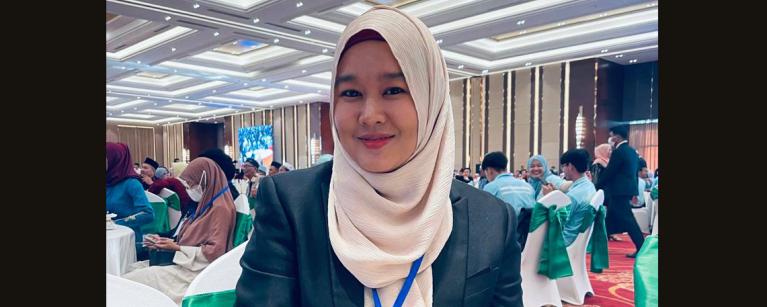Kob Karimash, a local leader at the Independent Democracy of Informal Economy Association (IDEA), has been a diligent advocate, teacher, and guide for her community, helping residents understand and access ID Poor cards. Her work has been crucial in ensuring that vulnerable families receive the aid and support they deserve.
Karimash, 37, is a food vendor who understands firsthand the challenges faced by workers in the informal economy, including daily discrimination, difficulties in dealing with authorities, and limited awareness of their rights.
From her breakfast snack stand in Russey Keo district in Phnom Penh, Karimash shares her story of joining IDEA as a regular member and gradually proving herself as a capable, determined leader. As a Muslim woman facing different struggles, her exceptional skills and commitment quickly earned her a leadership role in her community.
For nearly eight months, Karimash has been instrumental in driving IDEA’s mission, showing an unwavering dedication that has established her as a vital advocate for social protection within her community.
Under the FIRST project, implemented by IDEA and Oxfam with financial support from the European Union, Karimash has helped vendors in her neighborhood understand social protection, register for ID Poor cards, and learn about other available support.
As a local leader, Karimash assists self-employed workers and their families with enrolling in the voluntary social insurance for self-employed under the National Social Security Fund (NSSF), as well as the ID Poor Program. Much of her work involves educating her peers about their rights and the benefits of various social protection schemes.
““I inform vendors who have small businesses along the street and talk to them about the importance of the ID Poor cards and Health Equity cards. I share lessons on social protection and how to negotiate with the authorities in our community"”
Karimash dedicates her free time to educating others in various ways. She organizes study sessions, gathering around 25 people at a time to learn together. She also makes house visits to those needing extra help and meets with people who seek her guidance on specific issues. Despite her busy schedule, she conducts two to three community visits per week. “Before, their knowledge of the importance of the ID Poor Card was limited, now they have improved so much,” she says.
The main challenge street vendors face is obtaining approval from local authorities for ID Poor cards, which are crucial for accessing government support. In her community, residents often encounter obstacles when trying to secure ID Poor cards, including frequent rejections by authorities or even outright discrimination. For the largely Muslim population Karimash serves, these issues are compounded by religious discrimination.
Sometimes, people who qualify for ID Poor cards find their names on the eligibility list but are still rejected by authorities, despite clear financial need. Karimash’ advocacy helps them navigate complex bureaucratic processes, teaching them how to build relationships with local officials and persist through the application process.
She notes there is a gap in awareness in her community regarding the various benefits of the ID Poor card. “Some believe it’s only good for medical purposes, but it is crucial to inform them about other benefits, such as scholarships, maternity support, and financial assistance.”
However, engaging the community sometimes comes with challenges. Many residents, facing financial pressures, prioritize their immediate earnings over learning about these schemes. While she acknowledges that community involvement is crucial, she notes that “not everyone is cooperative.” Despite these obstacles, her dedication remains steadfast: “Do I give up on them? Of course, not; I am still happy to work on these issues.”
Karimash chose to work with IDEA because she saw an opportunity to support low-income individuals facing similar challenges to her own including motorbike taxi drivers and tuk-tuk drivers, to scrap collectors, domestic workers, and street vendors. “I joined IDEA to actively contribute to their effort and help raise awareness about the ID Poor Program,” she explains.
Before joining, Karimash often felt her voice was overlooked. Now, with the knowledge and experience she has gained, she is loudly heard in the community. She has become confident, especially when addressing authorities. Previously, they ignored her, but now they listen because she speaks with truth and knowledge.
